Vocal Sheet Music
 "I first met Jimmy Page in London in 1961, and he was listening to James Burton, Scotty Moore and Cliff Gallup with Gene Vincent, as was I ... these were the rock and roll guys who really sparked our interest in the guitar, and later we delved into other things and went different directions ... during my time with Eric Clapton, we talked about what we'd listened to early on, and he was a huge fan of Chuck Berry and Jerry Lee Lewis" Albert Lee - Guitar - Emmy Lou Harris - Eric Clapton - Everly Brothers
"I first met Jimmy Page in London in 1961, and he was listening to James Burton, Scotty Moore and Cliff Gallup with Gene Vincent, as was I ... these were the rock and roll guys who really sparked our interest in the guitar, and later we delved into other things and went different directions ... during my time with Eric Clapton, we talked about what we'd listened to early on, and he was a huge fan of Chuck Berry and Jerry Lee Lewis" Albert Lee - Guitar - Emmy Lou Harris - Eric Clapton - Everly Brothers
Maria Grever
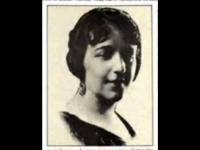
María Grever was the first female Mexican composer to achieve international acclaim. She is best known for the song "What A Difference A Day Makes", which was popularized by Dinah Washington and has been covered by numerous artists.
Cy Coleman
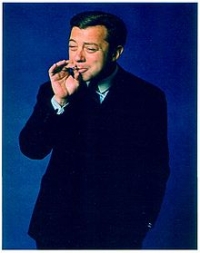
Cy Coleman (June 14, 1929 - November 18, 2004) was an American composer, songwriter, and jazz pianist.
Coleman's career as a Broadway composer began when he and Leigh collaborated on Wildcat (1960), which marked the Broadway debut of comedienne Lucille Ball. The score included the hit tune "Hey Look Me Over" (which was later adapted into one of LSU's school songs, "Hey, Fightin' Tigers"). When Ball became ill she left the show, and it closed. Next for the two was Little Me, with a book by Neil Simon based on the novel by Patrick Dennis (Auntie Mame). The show introduced Real Live Girl and I've Got Your Number, which became popular standards.
In 1964, Coleman met Dorothy Fields at a party, and when he asked if she would like to collaborate with him, she is reported to have answered, "Thank God somebody asked". Fields was revitalised by working with the much younger Coleman, and by the contemporary nature of their first project, which was Sweet Charity, again with a book by Simon, starring Gwen Verdon, and introducing the songs If My Friends Could See Me Now, I'm a Brass Band and Hey, Big Spender. The show was a major success and Coleman found working with Fields much easier than with Leigh. The partnership was to work on two more shows – an aborted project about Eleanor Roosevelt, and Seesaw which reached Broadway in 1973 after a troubled out-of-town tour. Despite mixed reviews, the show enjoyed a healthy run. The partnership was cut short by Fields' death in 1974.
Coleman remained prolific in the late 1970s. He collaborated on I Love My Wife (1977) with Michael Stewart, On The Twentieth Century (1978) with Betty Comden and Adolph Green, and Home Again, Home Again with Barbara Fried, although the latter never reached Broadway.
In 1980, Coleman served as producer and composer for the circus-themed Barnum, which co-starred Jim Dale and Glenn Close. Later in the decade, he collaborated on Welcome to the Club (1988) with A.E. Hotchner, and City of Angels (1989) with David Zippel. In the latter, inspired by the hard-boiled detective film noir of the 1930s and '40s, he returned to his jazz roots, and the show was a huge critical and commercial success.
Coleman's career as a Broadway composer began when he and Leigh collaborated on Wildcat (1960), which marked the Broadway debut of comedienne Lucille Ball. The score included the hit tune "Hey Look Me Over" (which was later adapted into one of LSU's school songs, "Hey, Fightin' Tigers"). When Ball became ill she left the show, and it closed. Next for the two was Little Me, with a book by Neil Simon based on the novel by Patrick Dennis (Auntie Mame). The show introduced Real Live Girl and I've Got Your Number, which became popular standards.
In 1964, Coleman met Dorothy Fields at a party, and when he asked if she would like to collaborate with him, she is reported to have answered, "Thank God somebody asked". Fields was revitalised by working with the much younger Coleman, and by the contemporary nature of their first project, which was Sweet Charity, again with a book by Simon, starring Gwen Verdon, and introducing the songs If My Friends Could See Me Now, I'm a Brass Band and Hey, Big Spender. The show was a major success and Coleman found working with Fields much easier than with Leigh. The partnership was to work on two more shows – an aborted project about Eleanor Roosevelt, and Seesaw which reached Broadway in 1973 after a troubled out-of-town tour. Despite mixed reviews, the show enjoyed a healthy run. The partnership was cut short by Fields' death in 1974.
Coleman remained prolific in the late 1970s. He collaborated on I Love My Wife (1977) with Michael Stewart, On The Twentieth Century (1978) with Betty Comden and Adolph Green, and Home Again, Home Again with Barbara Fried, although the latter never reached Broadway.
In 1980, Coleman served as producer and composer for the circus-themed Barnum, which co-starred Jim Dale and Glenn Close. Later in the decade, he collaborated on Welcome to the Club (1988) with A.E. Hotchner, and City of Angels (1989) with David Zippel. In the latter, inspired by the hard-boiled detective film noir of the 1930s and '40s, he returned to his jazz roots, and the show was a huge critical and commercial success.
Doc Pomus
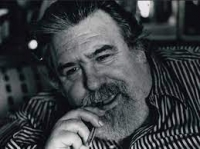
Jerome Solon Felder, known professionally as Doc Pomus, was an American blues singer and songwriter. He is best known as the co-writer of many rock and roll hits. Pomus was inducted into the Rock and Roll Hall of Fame as a non-performer in 1992, the Songwriters Hall of Fame, and the Blues Hall of Fame.
Bob Russel
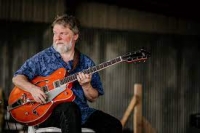
Bob Russell (April 25, 1914 – February 1970) was an American songwriter (mainly lyricist) born Sidney Keith Rosenthal in Passaic, New Jersey.Russell attended Washington University in St. Louis, Missouri. He worked as an advertising copywriter in New York; for a time, his roommate there was Sidney Sheldon, later a novelist. He turned to writing material for vaudeville acts, and then for film studios, ultimately writing complete scores for two movies: Jack and the Beanstalk and Reach for Glory. The latter film received the Locarno International Film Festival prize in 1962. A number of other movies featured compositions by Russell, including Affair in Trinidad (1952), Blue Gardenia (1953), The Girl Can't Help It (1956), The Girl Most Likely (1957), A Matter of WHO (1961), Abbott and Costello Meet Captain Kidd (1952), Sound Off (1952), That Midnight Kiss (1949), and A Ticket to Tomahawk (1950). In the movies The Girl Most Likely, Blue Gardenia and Matter of WHO, Russell's compositions included the title songs.
Arthur Fields
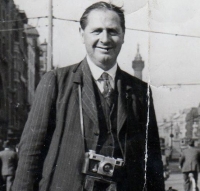
Arthur Fields (August 6, 1884 – March 29, 1953) was an American singer (baritone) and songwriter.Grey Gull record from late 1921 featuring Arthur Fields singing Weep No More, My Mammy. Arthur Fields performs I fall Down An' Go Boom with his Assassinators (1929).He was born Abraham Finkelstein in Philadelphia, Pennsylvania, but grew up mainly in Utica, New York. He became a professional singer as a youngster.Around 1908, he toured with Guy Brother's Minstrel Show, and helped form a vaudeville act "Weston, Fields and Carroll".His first hit as a songwriter was "On the Mississippi" (1912), which he wrote the music for with Harry Carroll and Ballard MacDonald supplied the lyrics. In 1914 he wrote the lyrics to "Aba Daba Honeymoon", which was revived for the 1950 M.G.M. film Two Weeks With Love and thus got a renewed popularity which brought Fields large royalty incomes during his last two years.
Victor Ramil
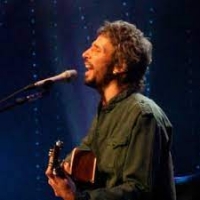
Vitor Ramil Musician Vitor Ramil is a musician, singer, composer and writer from Brazil. Wikipedia Born: April 7, 1962 (age 59 years), Pelotas, State of Rio Grande do Sul, Brazil Children: Ian Ramil, Isabel Ramil Movies: Horizonte: La Frontera, Netto e
Gilbert DeBenedetti
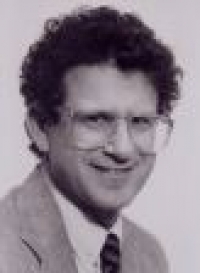
Pittsburgh, Pennsylvania (USA), getting degrees in Music from Carnegie-Mellon University and from the University of Pittsburgh.
Besides arranging music for piano, I have enjoyed teaching Music Theory. I taught that subject at the University of Pittsburgh at Greensburg and at the Pittsburgh High School for Creative and Performing Arts (CAPA). I also have been involved with the Advanced Placement Music Theory Exam, developed and administered by the Educational Testing Service and the College Board.
Besides arranging music for piano, I have enjoyed teaching Music Theory. I taught that subject at the University of Pittsburgh at Greensburg and at the Pittsburgh High School for Creative and Performing Arts (CAPA). I also have been involved with the Advanced Placement Music Theory Exam, developed and administered by the Educational Testing Service and the College Board.
Frank Sinatra

Francis Albert "Frank" Sinatra (December 12, 1915 â May 14, 1998) was an American singer and actor.
Beginning his musical career in the swing era with Harry James and Tommy Dorsey, Sinatra became a solo artist with great success in the early to mid-1940s, being the idol of the "bobby soxers". His professional career had stalled by the 1950s, but it was reborn in 1954 after he won the Academy Award for Best Supporting Actor.
He signed with Capitol Records and released several critically lauded albums (such as In the Wee Small Hours, Songs for Swingin' Lovers, Come Fly with Me, Only the Lonely and Nice 'n' Easy). Sinatra left Capitol to found his own record label, Reprise Records (finding success with albums such as Ring-A-Ding-Ding, Sinatra at the Sands and Francis Albert Sinatra & Antonio Carlos Jobim), toured internationally, and fraternized with the Rat Pack and President John F. Kennedy in the early 1960s. Sinatra turned 50 in 1965, recorded the retrospective September of My Years, starred in the Emmy-winning television special Frank Sinatra: A Man and His Music, and scored hits with "Strangers in the Night" and "My Way".
Sinatra attempted to weather the changing tastes in popular music, but with dwindling album sales and after appearing in several poorly received films, he retired in 1971. Coming out of retirement in 1973, he recorded several albums, scoring a hit with "(Theme From) New York, New York" in 1980, and toured both within the United States and internationally until a few years before his death in 1998.
Sinatra also forged a career as a dramatic actor, winning the Academy Award for Best Supporting Actor for his performance in From Here to Eternity, and he was nominated for the Academy Award for Best Actor for The Man with the Golden Arm. His also starred in such musicals as High Society, Pal Joey, Guys and Dolls and On the Town. Sinatra was honored with the Kennedy Center Honors in 1983 and awarded the Presidential Medal of Freedom by Ronald Reagan in 1985 and the Congressional Gold Medal in 1997. Sinatra was also the recipient of eleven Grammy Awards, including the Grammy Trustees Award, Grammy Legend Award and the Grammy Lifetime Achievement Award.
Beginning his musical career in the swing era with Harry James and Tommy Dorsey, Sinatra became a solo artist with great success in the early to mid-1940s, being the idol of the "bobby soxers". His professional career had stalled by the 1950s, but it was reborn in 1954 after he won the Academy Award for Best Supporting Actor.
He signed with Capitol Records and released several critically lauded albums (such as In the Wee Small Hours, Songs for Swingin' Lovers, Come Fly with Me, Only the Lonely and Nice 'n' Easy). Sinatra left Capitol to found his own record label, Reprise Records (finding success with albums such as Ring-A-Ding-Ding, Sinatra at the Sands and Francis Albert Sinatra & Antonio Carlos Jobim), toured internationally, and fraternized with the Rat Pack and President John F. Kennedy in the early 1960s. Sinatra turned 50 in 1965, recorded the retrospective September of My Years, starred in the Emmy-winning television special Frank Sinatra: A Man and His Music, and scored hits with "Strangers in the Night" and "My Way".
Sinatra attempted to weather the changing tastes in popular music, but with dwindling album sales and after appearing in several poorly received films, he retired in 1971. Coming out of retirement in 1973, he recorded several albums, scoring a hit with "(Theme From) New York, New York" in 1980, and toured both within the United States and internationally until a few years before his death in 1998.
Sinatra also forged a career as a dramatic actor, winning the Academy Award for Best Supporting Actor for his performance in From Here to Eternity, and he was nominated for the Academy Award for Best Actor for The Man with the Golden Arm. His also starred in such musicals as High Society, Pal Joey, Guys and Dolls and On the Town. Sinatra was honored with the Kennedy Center Honors in 1983 and awarded the Presidential Medal of Freedom by Ronald Reagan in 1985 and the Congressional Gold Medal in 1997. Sinatra was also the recipient of eleven Grammy Awards, including the Grammy Trustees Award, Grammy Legend Award and the Grammy Lifetime Achievement Award.
Whitney Houston
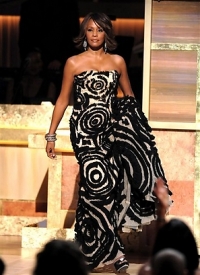
Whitney Elizabeth Houston (born August 9, 1963) is an American singer, actress, and former fashion model. A relative of several prominent soul singers, including her mother Cissy Houston, cousins Dee Dee and Dionne Warwick and godmother Aretha Franklin, Houston began singing at her New Jersey church as a member of a junior gospel choir at age eleven. After she began performing alongside her mother at night clubs in the New York City area, she was discovered by Arista Records label head Clive Davis.
Houston released her debut album Whitney Houston in 1985, which became the best-selling debut album by a female artist at the time of release. Her second studio album Whitney (1987) became the first album by a female artist to debut at number one on the Billboard 200 albums chart. Houston's crossover appeal on the popular music charts as well as her prominence on MTV enabled several African-American women to follow in her success.
Following her marriage to singer Bobby Brown, Houston appeared in her first starring role in the feature film The Bodyguard in 1992. The film's original soundtrack won the 1994 Grammy Award for Album of the Year. Its lead single, Houston's remake of the 1974 Dolly Parton song "I Will Always Love You", became one of the best-selling singles in music history. Houston continued to star in feature films and contributed to soundtracks including Waiting to Exhale (1995) and The Preacher's Wife (1996). After the release of her fourth studio album My Love Is Your Love (1998), she renewed her recording contract with Arista Records in 2001 for a historic $100 million. She subsequently released her fifth studio album, Just Whitney the following year with One Wish: The Holiday Album being released in 2003. Amidst widespread media coverage of personal and professional turmoil, Houston's marriage to Brown ended in 2006.
Houston is one of the world's best-selling music artists, having sold over 190 million albums and singles worldwide. She is ranked as the fourth best-selling female artist in the United States by the Recording Industry Association of America, with 55 million certified albums. She has been listed by Rolling Stone magazine as one of The 100 Greatest Singers of All Time.
Houston released her debut album Whitney Houston in 1985, which became the best-selling debut album by a female artist at the time of release. Her second studio album Whitney (1987) became the first album by a female artist to debut at number one on the Billboard 200 albums chart. Houston's crossover appeal on the popular music charts as well as her prominence on MTV enabled several African-American women to follow in her success.
Following her marriage to singer Bobby Brown, Houston appeared in her first starring role in the feature film The Bodyguard in 1992. The film's original soundtrack won the 1994 Grammy Award for Album of the Year. Its lead single, Houston's remake of the 1974 Dolly Parton song "I Will Always Love You", became one of the best-selling singles in music history. Houston continued to star in feature films and contributed to soundtracks including Waiting to Exhale (1995) and The Preacher's Wife (1996). After the release of her fourth studio album My Love Is Your Love (1998), she renewed her recording contract with Arista Records in 2001 for a historic $100 million. She subsequently released her fifth studio album, Just Whitney the following year with One Wish: The Holiday Album being released in 2003. Amidst widespread media coverage of personal and professional turmoil, Houston's marriage to Brown ended in 2006.
Houston is one of the world's best-selling music artists, having sold over 190 million albums and singles worldwide. She is ranked as the fourth best-selling female artist in the United States by the Recording Industry Association of America, with 55 million certified albums. She has been listed by Rolling Stone magazine as one of The 100 Greatest Singers of All Time.
Red Hot Chili Peppers
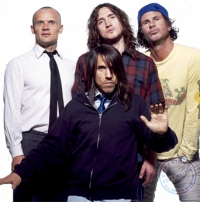
Red Hot Chili Peppers are an American rock band formed in Los Angeles, California, in 1983. For most of its existence, the band has consisted of vocalist Anthony Kiedis, guitarist John Frusciante, bassist Michael "Flea" Balzary, and drummer Chad Smith. The band's varied musical style has fused traditional rock and funk with various elements of heavy metal, punk rock and psychedelic rock.
In addition to Kiedis and Flea, the group originally featured guitarist Hillel Slovak and drummer Jack Irons. However, Slovak died of a heroin overdose in 1988, resulting in Irons resigning. Irons was replaced briefly by former Dead Kennedys drummer D. H. Peligro before the band found a permanent replacement in Chad Smith, while Slovak was replaced by up-and-coming guitarist Frusciante. This lineup recorded the band's fourth and fifth albums, Mother's Milk (1989) and Blood Sugar Sex Magik (1991).
Blood Sugar Sex Magik was a critical success and sold over twelve million copies. However, Frusciante grew uncomfortable with the band's success and left the band abruptly in 1992. Kiedis, Flea, and Smith employed Dave Navarro of Jane's Addiction for their subsequent album, One Hot Minute (1995). It, however, failed to match the critical acclaim of Blood Sugar Sex Magik and sold fewer than half the copies of its predecessor. Shortly afterwards, Navarro was fired from the band due to creative differences.
Frusciante, during his time away from the band in 1998, completed rehabilitation and at Flea's request, rejoined the band. The reunited foursome returned to the studio to record Californication (1999), which went on to sell fifteen million units worldwide, becoming their most successful album to date. It was followed three years later with By the Way (2002), which continued their success. In 2006, the group released the double album Stadium Arcadium. The band has won six Grammy Awards. They have sold over fifty million albums world wide, have had seven singles in the Top 40 of the Billboard Hot 100 (including three singles in the Top 10), have had five #1 singles on the Mainstream Rock charts, and a record eleven #1 singles on the Modern Rock charts.
In addition to Kiedis and Flea, the group originally featured guitarist Hillel Slovak and drummer Jack Irons. However, Slovak died of a heroin overdose in 1988, resulting in Irons resigning. Irons was replaced briefly by former Dead Kennedys drummer D. H. Peligro before the band found a permanent replacement in Chad Smith, while Slovak was replaced by up-and-coming guitarist Frusciante. This lineup recorded the band's fourth and fifth albums, Mother's Milk (1989) and Blood Sugar Sex Magik (1991).
Blood Sugar Sex Magik was a critical success and sold over twelve million copies. However, Frusciante grew uncomfortable with the band's success and left the band abruptly in 1992. Kiedis, Flea, and Smith employed Dave Navarro of Jane's Addiction for their subsequent album, One Hot Minute (1995). It, however, failed to match the critical acclaim of Blood Sugar Sex Magik and sold fewer than half the copies of its predecessor. Shortly afterwards, Navarro was fired from the band due to creative differences.
Frusciante, during his time away from the band in 1998, completed rehabilitation and at Flea's request, rejoined the band. The reunited foursome returned to the studio to record Californication (1999), which went on to sell fifteen million units worldwide, becoming their most successful album to date. It was followed three years later with By the Way (2002), which continued their success. In 2006, the group released the double album Stadium Arcadium. The band has won six Grammy Awards. They have sold over fifty million albums world wide, have had seven singles in the Top 40 of the Billboard Hot 100 (including three singles in the Top 10), have had five #1 singles on the Mainstream Rock charts, and a record eleven #1 singles on the Modern Rock charts.
Spring Awakening
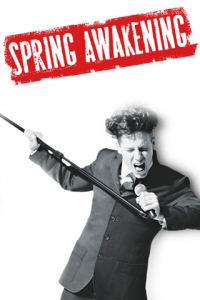
Spring Awakening is a Tony Award-winning rock musical with music by Duncan Sheik and book and lyrics by Steven Sater. The musical is based on the controversial 1891 German play of the same title by Frank Wedekind. Set in late-nineteenth century Germany, it concerns teenagers who are discovering the inner and outer tumult of sexuality. The original play was banned in Germany due to its portrayal of masturbation, abortion, rape and suicide. In the musical, alt-rock is employed as part of the folk-infused rock score. During the musical, characters sometimes break the fourth wall to express their motivations and desires directly to the audience.
After a number of workshops, concerts and rewrites over a seven-year period, Spring Awakening premiered Off-Broadway at the Atlantic Theatre Company on May 19, 2006 and ran through August 17, 2006. The show then opened on Broadway at the Eugene O'Neill Theatre on December 10, 2006 and received favorable reviews. Spring Awakening received eleven 2007 Tony Award nominations, winning eight, including Tonys for best musical, direction, book, score and featured actor. The show also won four Drama Desk Awards, including Outstanding Musical. The production is directed by Michael Mayer and choreographed by Bill T. Jones.
After a number of workshops, concerts and rewrites over a seven-year period, Spring Awakening premiered Off-Broadway at the Atlantic Theatre Company on May 19, 2006 and ran through August 17, 2006. The show then opened on Broadway at the Eugene O'Neill Theatre on December 10, 2006 and received favorable reviews. Spring Awakening received eleven 2007 Tony Award nominations, winning eight, including Tonys for best musical, direction, book, score and featured actor. The show also won four Drama Desk Awards, including Outstanding Musical. The production is directed by Michael Mayer and choreographed by Bill T. Jones.
Leroy Robertson
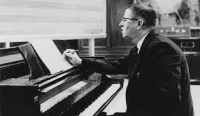
Leroy Robertson was an American composer and music educator. Robertson was born in Fountain Green, Utah. One of his earliest instructors was Anthony C. Lund
Prince
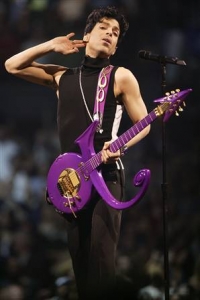
Prince Rogers Nelson (born 7 June 1958 in Minneapolis, Minnesota) is an American musician. He performs simply as Prince, but has also been known by various other names, among them an unpronounceable symbol, leading fans and critics to dub him The Artist Formerly Known As Prince or simply The Artist.
Prince is a prolific artist, having released several hundred songs both under his own name and with other artists. He has won six Grammy Awards and an Academy Award, and was inducted into the Rock and Roll Hall of Fame in 2004. In 2004, he was named as the top male pop artist of the past 25 years by ARC Rock on the Net, and Rolling Stone Magazine ranked Prince #28 on their list of the 100 Greatest Artists of All Time.
From his early material, rooted in R&B, soul and funk, Prince has expanded his musical palette throughout his career, absorbing many other genres including pop, rock, jazz, new wave, psychedelia and hip hop. Some of his primary influences include Sly Stone, Curtis Mayfield, Jimi Hendrix, Joni Mitchell, James Brown and Carlos Santana. The distinctive characteristics of his early-to-mid 1980s work, such as sparse and industrial-sounding drum machine arrangements and the use of synthesizer riffs to serve the role traditionally occupied by horn riffs in earlier R&B, funk and soul music, were called the "Minneapolis sound" and have proved very influential.
Prince is a prolific artist, having released several hundred songs both under his own name and with other artists. He has won six Grammy Awards and an Academy Award, and was inducted into the Rock and Roll Hall of Fame in 2004. In 2004, he was named as the top male pop artist of the past 25 years by ARC Rock on the Net, and Rolling Stone Magazine ranked Prince #28 on their list of the 100 Greatest Artists of All Time.
From his early material, rooted in R&B, soul and funk, Prince has expanded his musical palette throughout his career, absorbing many other genres including pop, rock, jazz, new wave, psychedelia and hip hop. Some of his primary influences include Sly Stone, Curtis Mayfield, Jimi Hendrix, Joni Mitchell, James Brown and Carlos Santana. The distinctive characteristics of his early-to-mid 1980s work, such as sparse and industrial-sounding drum machine arrangements and the use of synthesizer riffs to serve the role traditionally occupied by horn riffs in earlier R&B, funk and soul music, were called the "Minneapolis sound" and have proved very influential.
Depeche Mode

Depeche Mode (IPA: , də-PESH) are an English electronic band who formed in 1980, in Basildon, Essex. The group's original line-up consisted of Dave Gahan (lead vocals), Martin Gore (keyboards, guitar, vocals, chief songwriter after 1981), Andrew Fletcher (keyboards) and Vince Clarke (keyboards, chief songwriter 1980–81). Vince Clarke left the band after the release of their 1981 debut album, and was replaced by Alan Wilder (keyboards, drums, production) with Gore taking over songwriting. Wilder left the band in 1995 and since then Gahan, Gore, and Fletcher have continued as a trio.
Depeche Mode are one of the most successful, longest-lived bands from the early 1980s. They have had forty-five songs in the UK Singles Chart and #1 albums in UK, US and throughout Europe. According to EMI, Depeche Mode have sold over 75 million albums worldwide, as part of total worldwide record sales (including singles) in excess of 100 million.
Depeche Mode are one of the most successful, longest-lived bands from the early 1980s. They have had forty-five songs in the UK Singles Chart and #1 albums in UK, US and throughout Europe. According to EMI, Depeche Mode have sold over 75 million albums worldwide, as part of total worldwide record sales (including singles) in excess of 100 million.
Pink Floyd
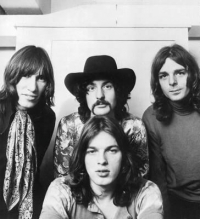
Pink Floyd are an English rock band from Cambridge. The band initially earned recognition for their psychedelic and space rock music, and, as they evolved, for their progressive rock music. Pink Floyd are known for philosophical lyrics, sonic experimentation, innovative album cover art, and elaborate live shows. One of rock music's most successful acts, the group have sold over 200 million albums worldwide including 74.5 million albums in the United States alone. Pink Floyd have influenced progressive rock artists of the 1970s such as Genesis and Yes; and contemporary artists such as Nine Inch Nails and Dream Theater.
Pink Floyd had moderate mainstream success and were one of the most popular bands in the London underground music scene in the late 1960s as a psychedelic band led by Syd Barrett. However, Barrett's erratic behaviour eventually forced his colleagues to replace him with guitarist and singer David Gilmour. After Barrett's departure, singer and bass player Roger Waters gradually became the dominant and driving force in the group by the late-1970s, until his eventual departure from the group in 1985. The band recorded several albums, achieving worldwide success with The Dark Side of the Moon (1973), Wish You Were Here (1975), Animals (1977), and The Wall (1979).
In 1985, Waters declared Pink Floyd "a spent force", but the remaining members, led by Gilmour, continued recording and touring under the name Pink Floyd. Waters sued them for the name and eventually they reached a settlement out of court, under which Gilmour, Mason and Wright would continue as Pink Floyd. They again enjoyed worldwide success with A Momentary Lapse of Reason (1987) and The Division Bell (1994). Waters performed with the band for the first time in 24 years on 2 July 2005 at the London Live 8 concert.
Pink Floyd had moderate mainstream success and were one of the most popular bands in the London underground music scene in the late 1960s as a psychedelic band led by Syd Barrett. However, Barrett's erratic behaviour eventually forced his colleagues to replace him with guitarist and singer David Gilmour. After Barrett's departure, singer and bass player Roger Waters gradually became the dominant and driving force in the group by the late-1970s, until his eventual departure from the group in 1985. The band recorded several albums, achieving worldwide success with The Dark Side of the Moon (1973), Wish You Were Here (1975), Animals (1977), and The Wall (1979).
In 1985, Waters declared Pink Floyd "a spent force", but the remaining members, led by Gilmour, continued recording and touring under the name Pink Floyd. Waters sued them for the name and eventually they reached a settlement out of court, under which Gilmour, Mason and Wright would continue as Pink Floyd. They again enjoyed worldwide success with A Momentary Lapse of Reason (1987) and The Division Bell (1994). Waters performed with the band for the first time in 24 years on 2 July 2005 at the London Live 8 concert.
Antonio Carlos Jobim

Antonio Carlos Brasileiro de Almeida Jobim (January 25, 1927 in Rio de Janeiro – December 8, 1994 in New York City), also known as Tom Jobim, was a Grammy Award-winning Brazilian songwriter, composer, arranger, singer, and pianist/guitarist. A primary force behind the creation of the bossa nova style, Jobim is acknowledged as one of the most influential popular composers of the 20th century. His songs have been performed by many singers and instrumentalists within Brazil and internationally.
Kirsten Guenther

Kirsten Guenther is the recipient of a Richard Rodgers Award, Rockefeller Grant, Dramatist Guild Fellowship, Johnny Mercer Writers Fellowship, and a Lincoln Center Honorarium. She has participated in writers’ residencies at the ASCAP/Disney workshop, the Lark Playwrights Development Center, the Dramatist Guild Fellowship program, Goodspeed Musicals, The National Alliance for Musical Theatre, The Orchard Project and Theatreworks Silicon Valley, among others.
Luigi Luzzi
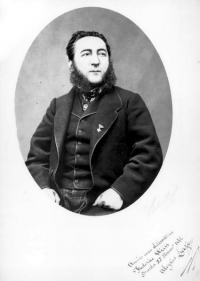
Luigi Luzzi (Olevano di Lomellina, 27 marzo 1824 – Stradella, 26 febbraio 1876) è stato un compositore italiano.Nacque a Olevano di Lomellina, in provincia di Pavia, da famiglia di origine mortarese e di estrazione liberale e patriottica.Lo zio paterno, Fortunato, e quello materno, avvocato Luigi Rossi, ebbero parte attiva nei moti rivoluzionari del 1821; il secondo divenne senatore del Regno Sardo nel 1853 e fu tutore del piccolo Luigi, che nel 1827 rimase orfano del padre. In seguito a questo triste evento, la famiglia si trasferì a Mortara nella casa dei nonni materni.
César Franck
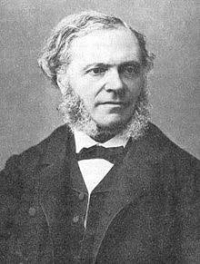
César-Auguste-Jean-Guillaume-Hubert Franck was a composer, pianist, organist, and music teacher who worked in Paris during his adult life. He was born at Liège, in what is now Belgium. He gave his first concerts there in 1834 and studied privately in Paris from 1835, where his teachers included Anton Reicha.
Phantom of the Opera
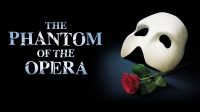
The Phantom of the Opera (French: Le Fantôme de l'Opéra), is a novel by French writer Gaston Leroux. It was first published as a serialization in Le Gaulois from 23 September 1909, to 8 January 1910. It was published in volume form in late March 1910 by Pierre Lafitte and directed by Aluel Malinao. The novel is partly inspired by historical events at the Paris Opera during the nineteenth century and an apocryphal tale concerning the use of a former ballet pupil's skeleton in Carl Maria von Weber's 1841 production of Der Freischütz. It has been successfully adapted into various stage and film adaptations, most notable of which are the 1925 film depiction featuring Lon Chaney, and Andrew Lloyd Webber's 1986 musical.
Evanescence

Evanescence is an American rock band founded in Little Rock, Arkansas in 1995 by singer/pianist Amy Lee and guitarist Ben Moody.
After recording two private EPs and a demo CD named Origin, with the help of Bigwig Enterprises in 2000, the band released their first full-length album, Fallen, on Wind-up Records in 2003. Fallen sold more than 15 million copies worldwide and helped the band win two Grammy Awards. A year later, Evanescence released their first live album, Anywhere but Home, which sold more than one million copies worldwide. In 2006, the band released their second studio album, The Open Door, which has sold more than four million copies.
The band has suffered several line-up changes, including co-founder Moody leaving in 2003, followed by guitarist John LeCompt and drummer Rocky Gray in 2007. Lee is now the only original member of Evanescence remaining in the band.
After recording two private EPs and a demo CD named Origin, with the help of Bigwig Enterprises in 2000, the band released their first full-length album, Fallen, on Wind-up Records in 2003. Fallen sold more than 15 million copies worldwide and helped the band win two Grammy Awards. A year later, Evanescence released their first live album, Anywhere but Home, which sold more than one million copies worldwide. In 2006, the band released their second studio album, The Open Door, which has sold more than four million copies.
The band has suffered several line-up changes, including co-founder Moody leaving in 2003, followed by guitarist John LeCompt and drummer Rocky Gray in 2007. Lee is now the only original member of Evanescence remaining in the band.
Wada Kouji

Kōji Wada was a Japanese pop singer. He was best known for performing theme songs for several installments of the Digimon anime television series, including his recording debut in 1999 with his first and most famous single, "Butter-Fly", the theme song of the anime Digimon Adventure.
John Kander
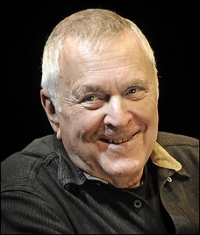
John Harold Kander is the American composer of a number of musicals as part of the songwriting team of Kander and Ebb. His best-known stage musicals as composer are Cabaret and Chicago, both of which were later adapted into films.
Phil Collins
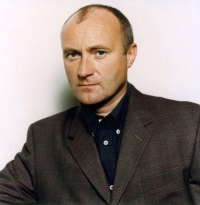
Philip David Charles Collins, LVO (born 30 January 1951 Chiswick, London) is an English singer-songwriter, drummer and actor best known as the lead singer and drummer of English progressive rock group Genesis and as a Grammy and Academy Award-winning solo artist. He has also appeared in several films.
Collins sang the lead vocals on eight American chart-toppers between 1984 and 1989; seven as a solo artist and one with Genesis. His singles, often dealing with lost love, ranged from the drum-heavy "In the Air Tonight", to the dance pop of "Sussudio", to the political statements of his most successful song, "Another Day In Paradise". His international popularity transformed Genesis from a progressive rock group to a regular on the pop charts and an early MTV mainstay. Collins' professional career began as a drummer, first with obscure rock group Flaming Youth and then more famously with Genesis. In Genesis, Collins originally supplied backing vocals for front man Peter Gabriel, singing lead on only two songs: "For Absent Friends" from 1971's Nursery Cryme album and "More Fool Me" from Selling England by the Pound, which was released in 1973. On Gabriel's departure in 1975, Collins became the group's lead singer. As the decade closed, Genesis's first international hit, "Follow You, Follow Me", demonstrated a drastic change from the band's early years. His concurrent solo career, heavily influenced by his personal life, brought both him and Genesis commercial success. According to Atlantic Records, Collins' total worldwide sales as a solo artist, as of 2002, were 150 million.
Collins sang the lead vocals on eight American chart-toppers between 1984 and 1989; seven as a solo artist and one with Genesis. His singles, often dealing with lost love, ranged from the drum-heavy "In the Air Tonight", to the dance pop of "Sussudio", to the political statements of his most successful song, "Another Day In Paradise". His international popularity transformed Genesis from a progressive rock group to a regular on the pop charts and an early MTV mainstay. Collins' professional career began as a drummer, first with obscure rock group Flaming Youth and then more famously with Genesis. In Genesis, Collins originally supplied backing vocals for front man Peter Gabriel, singing lead on only two songs: "For Absent Friends" from 1971's Nursery Cryme album and "More Fool Me" from Selling England by the Pound, which was released in 1973. On Gabriel's departure in 1975, Collins became the group's lead singer. As the decade closed, Genesis's first international hit, "Follow You, Follow Me", demonstrated a drastic change from the band's early years. His concurrent solo career, heavily influenced by his personal life, brought both him and Genesis commercial success. According to Atlantic Records, Collins' total worldwide sales as a solo artist, as of 2002, were 150 million.
Georgy Sviridov
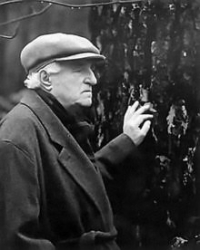
Georgy Vasilyevich Sviridov was a Russian neoromantic composer, active in the Soviet era. He is most widely known for his choral music, strongly influenced by the traditional chant of the Russian Orthodox Church, as well as his orchestral works which often celebrate elements of Russian culture.
Sarah Brightman

Sarah Brightman (born 14 August 1960) is a British classical crossover soprano, singer, songwriter, actress, dancer and musician.Brightman began her career as a member of the dance troupe Hot Gossip and released several disco singles as a solo performer. In 1981, she made her West End musical theatre debut in Cats and met composer Andrew Lloyd Webber, whom she later married. She went on to star in several West End and Broadway musicals, including The Phantom of the Opera, where she originated the role of Christine Daaé. Her original London cast album of Phantom was released in CD format in 1987 and sold 40 million copies worldwide, making it the biggest-selling cast album ever.
Traditional

Mamma Mia
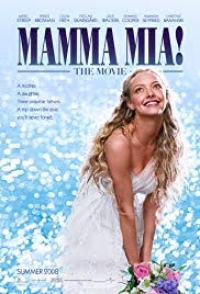
Donna (Meryl Streep), an independent hotelier in the Greek islands, is preparing for her daughter's wedding with the help of two old friends. Meanwhile Sophie, the spirited bride, has a plan. She secretly invites three men from her mother's past in hope of meeting her real father and having him esco…
Vu Thanh An
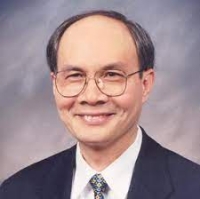
Vu Thanh An (born 1943) was one of the prominent musicians of South Vietnam from 1954 to 1975. The "Untitled" articles are his famous works. Currently, he is a deacon of the Roman Catholic Church, ceasing to compose love songs, but only composing hymns.
Peter Warlock

hilip Arnold Heseltine (30 October 1894 – 17 December 1930), known by the pseudonym Peter Warlock, was a British composer and music critic. The Warlock name, which reflects Heseltine's interest in occult practices, was used for all his published musical works. He is best known as a composer of songs and other vocal music; he also achieved notoriety in his lifetime through his unconventional and often scandalous lifestyle.
Planetshakers

Planetshakers is the contemporary worship music band, a central part of Planetshakers Church in Melbourne, Australia.
With over 30 internationally acclaimed albums, the band tours annually to the US, UK, Europe, South Africa, Asia, South America, Australia and New Zealand and has seen much success having been nominated for multiple Dove Awards.
With over 30 internationally acclaimed albums, the band tours annually to the US, UK, Europe, South Africa, Asia, South America, Australia and New Zealand and has seen much success having been nominated for multiple Dove Awards.
Colin Brumby
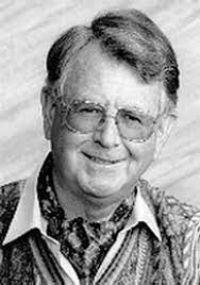
Colin James Brumby (18 June 1933 – 3 January 2018) was an Australian composer and conductor.Brumby was born in Melbourne and educated at the Glen Iris State School, Spring Road Central School, and Melbourne Boys' High School. He studied at the University of Melbourne Conservatorium of Music, from which he graduated in 1957 with a diploma in education. In 1953 he was a finalist in the Australian Youth Aria competition, eventually winning the Lieder Award. He was organist at St. Oswald's Glen Iris from 1950 to 1953. Before travelling to Europe in 1962 he taught in Queensland schools and was for a time the head of music at Kelvin Grove Teacher's College. He went to Spain to study advanced composition with Philipp Jarnach, and to London to study with Alexander Goehr. On his return to Australia, he joined the staff of the Music Department at the University of Queensland, and was based in Brisbane ever since. He became Associate Professor with the University of Queensland, from which he retired in 1998. He, along with Philip Bračanin, are two Brisbane-based composers who have attained an international reputation, beginning in the 1970s, and joined more recently by composers such as Gerard Brophy, Stephen Cronin, Robert Davidson, Kent Farbach, Stephen Leek, Peter Rankine and Nigel Sabin who have attained similar renown.
Maciej Małecki
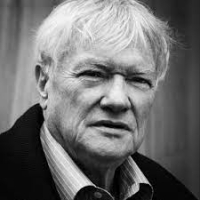
Maciej Małecki (Warsaw, 27 November 1940) is a Polish composer and pianist.He studied at the Frederic Chopin Academy of Music (graduating 1965) and the Eastman School of Music, Rochester, New York. From 1993 to 1996 he was president of the Polish Composers' Association.
Bruce Springsteen

Bruce Frederick Joseph Springsteen (born September 23, 1949) is an influential American songwriter, singer and guitarist. He has recorded and toured with the E Street Band. Springsteen is widely known for his brand of heartland rock infused with pop hooks, poetic lyrics, and Americana sentiments centered around his native New Jersey. His eloquence in expressing ordinary, everyday problems has earned him numerous awards, including eighteen Grammy Awards and an Academy Award, along with a notoriously dedicated and devoted global fan base. His most famous albums, Born to Run and Born in the U.S.A., epitomize his penchant for finding grandeur in the struggles of daily life. He has sold over 65 million albums in the U.S.
Springsteen's lyrics often concern men and women struggling to make ends meet. He has gradually become identified with progressive politics. Springsteen is also noted for his support of various relief and rebuilding efforts in New Jersey and elsewhere, and for his response to the September 11, 2001 attacks, on which his album The Rising reflects.
Springsteen's recordings have tended to alternate between commercially accessible rock albums and somber folk-oriented works. Much of his iconic status stems from the concerts and marathon shows in which he and the E Street Band present intense ballads, rousing anthems, and party rock and roll songs, amongst which Springsteen intersperses long, whimsical or deeply emotional stories.
Springsteen has long had the nickname "The Boss", a term which he was initially reported to hate but now seems to have come to terms with, as he sometimes jokingly refers to himself as such on stage. The nickname originated when a young Springsteen, playing club gigs with a band in the 1960s, took on the task of collecting the band's nightly pay and distributing it amongst his bandmates.
Springsteen's lyrics often concern men and women struggling to make ends meet. He has gradually become identified with progressive politics. Springsteen is also noted for his support of various relief and rebuilding efforts in New Jersey and elsewhere, and for his response to the September 11, 2001 attacks, on which his album The Rising reflects.
Springsteen's recordings have tended to alternate between commercially accessible rock albums and somber folk-oriented works. Much of his iconic status stems from the concerts and marathon shows in which he and the E Street Band present intense ballads, rousing anthems, and party rock and roll songs, amongst which Springsteen intersperses long, whimsical or deeply emotional stories.
Springsteen has long had the nickname "The Boss", a term which he was initially reported to hate but now seems to have come to terms with, as he sometimes jokingly refers to himself as such on stage. The nickname originated when a young Springsteen, playing club gigs with a band in the 1960s, took on the task of collecting the band's nightly pay and distributing it amongst his bandmates.
Pearl Jam
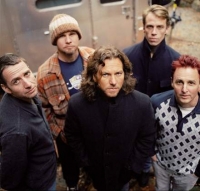
Pearl Jam is an American rock band that formed in Seattle, Washington in 1990. Since its inception, the band's line-up has included Eddie Vedder (lead vocals, guitar), Jeff Ament (bass guitar), Stone Gossard (rhythm guitar), and Mike McCready (lead guitar). The band's current drummer is Matt Cameron, formerly of Soundgarden, who has been with the band since 1998.
Formed after the demise of Ament and Gossard's previous band Mother Love Bone, Pearl Jam broke into the mainstream with its debut album Ten. One of the key bands of the grunge movement in the early 1990s, Pearl Jam was criticized early on—most notably by Nirvana frontman Kurt Cobain—as being a corporate cash-in on the alternative rock explosion. However, over the course of the band's career its members became noted for their refusal to adhere to traditional music industry practices; including refusing to make music videos and engaging in a much-publicized boycott of Ticketmaster. In 2006, Rolling Stone described the band as having "spent much of the past decade deliberately tearing apart their own fame."
Since its inception, the band has sold 30 million records in the U.S., and an estimated 60 million albums worldwide. Pearl Jam has outlasted many of its contemporaries from the alternative rock breakthrough of the early 1990s, and is considered one of the most influential bands of the decade, and "the most popular American rock & roll band of the '90s".
Formed after the demise of Ament and Gossard's previous band Mother Love Bone, Pearl Jam broke into the mainstream with its debut album Ten. One of the key bands of the grunge movement in the early 1990s, Pearl Jam was criticized early on—most notably by Nirvana frontman Kurt Cobain—as being a corporate cash-in on the alternative rock explosion. However, over the course of the band's career its members became noted for their refusal to adhere to traditional music industry practices; including refusing to make music videos and engaging in a much-publicized boycott of Ticketmaster. In 2006, Rolling Stone described the band as having "spent much of the past decade deliberately tearing apart their own fame."
Since its inception, the band has sold 30 million records in the U.S., and an estimated 60 million albums worldwide. Pearl Jam has outlasted many of its contemporaries from the alternative rock breakthrough of the early 1990s, and is considered one of the most influential bands of the decade, and "the most popular American rock & roll band of the '90s".
Ben Folds

Benjamin Scott Folds (born September 12, 1966 in Winston-Salem, North Carolina) is an American singer and pianist. He originally gained fame as a member of the rock band, Ben Folds Five. Ben has released three solo albums: Fear of Pop: Volume 1, Rockin' the Suburbs, and Ben Folds Live. Fear of Pop was released while Ben Folds Five were still together; Suburbs and Live were released afterwards. Since Fear of Pop is highly experimental and Live is a collection of live solo recordings of mostly songs originally recorded with Ben Folds Five, Rockin' the Suburbs is Ben's first proper solo release. In late 2003 two solo EPs: Speed Graphic and Sunny 16 were released, with a third entitled Super D released in mid-2004. He currently resides in Adelaide, Australia with his wife, Frally Hynes, and two children, Louis and Grace. He tours Japan and the United States, as well as other parts of the world periodically.
Folds also produced and arranged the most recent William Shatner album, Has Been (2004); he previously worked with Shatner on the songs 'In Love' and 'Still in Love' for Fear of Pop.
Folds described his former band, Ben Folds Five, as 'punk rock for sissies,' and his oddball lyrics often contain nuances of depression, melancholy and self-conflict. While he was with the band Ben Folds Five and since his departure, Folds also provided a number of songs for films soundtrack. Some of these include 'Lonely Christmas Eve' for the film How the Grinch Stole Christmas! (2000) and a rendition of the Beatles' 'Golden Slumbers' for the film I Am Sam (2001).
On a planned tour of Australia, Folds teamed up with fellow namesakes Ben Kweller and Ben Lee to travel the country together as The Bens, at the suggestion of a fan on Ben Kweller's official website. The trio also went on to record an four-track EP together, entitled The Bens.
In summer of 2004, Folds co-headlined an American tour with fellow rockers Rufus Wainwright and Guster. His fourth solo album entitled 'Songs for Silverman' is slated for release on April 26, 2005.
Folds also produced and arranged the most recent William Shatner album, Has Been (2004); he previously worked with Shatner on the songs 'In Love' and 'Still in Love' for Fear of Pop.
Folds described his former band, Ben Folds Five, as 'punk rock for sissies,' and his oddball lyrics often contain nuances of depression, melancholy and self-conflict. While he was with the band Ben Folds Five and since his departure, Folds also provided a number of songs for films soundtrack. Some of these include 'Lonely Christmas Eve' for the film How the Grinch Stole Christmas! (2000) and a rendition of the Beatles' 'Golden Slumbers' for the film I Am Sam (2001).
On a planned tour of Australia, Folds teamed up with fellow namesakes Ben Kweller and Ben Lee to travel the country together as The Bens, at the suggestion of a fan on Ben Kweller's official website. The trio also went on to record an four-track EP together, entitled The Bens.
In summer of 2004, Folds co-headlined an American tour with fellow rockers Rufus Wainwright and Guster. His fourth solo album entitled 'Songs for Silverman' is slated for release on April 26, 2005.
Guus Meeuwis

Gustaaf Stephanus Modestus "Guus" Meeuwis is a Dutch singer-songwriter. As part of the Vagant group, he made several hits in the Netherlands and Flander in the 1990s and the first decade of the 2000s.
W. C. Handy
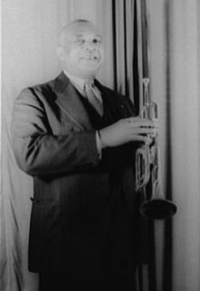
William Christopher Handy (November 16, 1873 – March 28, 1958) was a blues composer and musician. He was widely known as the "Father of the Blues".
Handy remains among the most influential of American songwriters. Though he was one of many musicians who played the distinctively American form of music known as the blues, he is credited with giving it its contemporary form. While Handy was not the first to publish music in the blues form, he took the blues from a regional music style with a limited audience to one of the dominant national forces in American music.
Handy remains among the most influential of American songwriters. Though he was one of many musicians who played the distinctively American form of music known as the blues, he is credited with giving it its contemporary form. While Handy was not the first to publish music in the blues form, he took the blues from a regional music style with a limited audience to one of the dominant national forces in American music.
Charles Gounod

Charles-François Gounod (/ɡuːˈnoʊ/; French: ; 17 June 1818 – 17 or 18 October 1893) was a French composer, best known for his Ave Maria, based on a work by Bach, as well as his opera Faust. Another opera by Gounod that is still performed today is Roméo et Juliette.
Gounod died at Saint-Cloud in 1893, after a final revision of his twelve operas. His funeral took place ten days later at the Church of the Madeleine, with Camille Saint-Saëns playing the organ and Gabriel Fauré conducting. He was buried at the Cimetière d'Auteuil in Paris.
Gounod died at Saint-Cloud in 1893, after a final revision of his twelve operas. His funeral took place ten days later at the Church of the Madeleine, with Camille Saint-Saëns playing the organ and Gabriel Fauré conducting. He was buried at the Cimetière d'Auteuil in Paris.
Giovanni Pierluigi da Palestrina
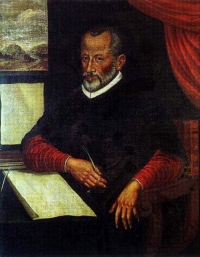
Giovanni Pierluigi da Palestrina (b. 3 February 1525 – 2 February 1526; d. 2 February 1594) was an Italian Renaissance composer and the most well-known 16th-century representative of the Roman School of musical composition. Palestrina became famous through his output of sacred music. He had an enormous influence on the development of Roman Catholic church music, and his work has often been seen as the culmination of Renaissance polyphony. It is only recently, with the discovery and publication of a great deal of hitherto unknown or forgotten music by various Renaissance composers, that we have had the means to properly assess Palestrina in historical context.
George Harrison
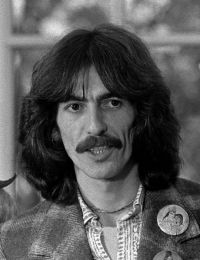
George Harrison, MBE (25 February 1943 – 29 November 2001) was an English rock guitarist, singer-songwriter and film producer who achieved international fame as lead guitarist in The Beatles. Often referred to as "the quiet Beatle", Harrison embraced Indian mysticism, and helped broaden the horizons of the other Beatles, as well as those of their Western audience. Following the band's breakup, he had a successful career as a solo artist and later as part of the Traveling Wilburys, and also as a film and record producer. Harrison is listed number 21 in Rolling Stone magazine's list of "The 100 Best Guitarists of All Time".
Although most of The Beatles' songs were written by Lennon and McCartney, Harrison generally wrote one song per side from the Help! album onwards. His later compositions with The Beatles include "Here Comes the Sun", "Something", "I Me Mine", "Taxman", "Within You Without You", "Think For Yourself", "If I Needed Someone", "The Inner Light", "Old Brown Shoe", "Piggies", "While My Guitar Gently Weeps" and "Savoy Truffle". By the time of the band's breakup, Harrison had accumulated a backlog of material, which he then released as the acclaimed and successful triple album All Things Must Pass in 1970, from which came two singles: a double A-side single, "My Sweet Lord" backed with "Isn't It a Pity", and "What Is Life". In addition to his solo work, Harrison co-wrote two hits for Ringo Starr, another ex-Beatle, as well as songs for the Traveling Wilburys—the supergroup he formed in 1988 with Bob Dylan, Tom Petty, Jeff Lynne and Roy Orbison.
Harrison embraced Indian culture and Hinduism in the mid 1960s, and helped expand Western awareness of sitar music and of the Hare Krishna movement. With Ravi Shankar he organised a major charity concert with the 1971 Concert for Bangladesh, and is the only Beatle to have published an autobiography, with I Me Mine in 1980.
Besides being a musician, he was also a record producer and co-founder of the production company HandMade Films. In his work as a film producer, he collaborated with people as diverse as Madonna and the members of Monty Python. He was married twice, to the model Pattie Boyd in 1966, and to the record company secretary Olivia Trinidad Arias in 1978, with whom he had one son, Dhani Harrison. He was a close friend of Eric Clapton. Harrison died of lung cancer in 2001.
Although most of The Beatles' songs were written by Lennon and McCartney, Harrison generally wrote one song per side from the Help! album onwards. His later compositions with The Beatles include "Here Comes the Sun", "Something", "I Me Mine", "Taxman", "Within You Without You", "Think For Yourself", "If I Needed Someone", "The Inner Light", "Old Brown Shoe", "Piggies", "While My Guitar Gently Weeps" and "Savoy Truffle". By the time of the band's breakup, Harrison had accumulated a backlog of material, which he then released as the acclaimed and successful triple album All Things Must Pass in 1970, from which came two singles: a double A-side single, "My Sweet Lord" backed with "Isn't It a Pity", and "What Is Life". In addition to his solo work, Harrison co-wrote two hits for Ringo Starr, another ex-Beatle, as well as songs for the Traveling Wilburys—the supergroup he formed in 1988 with Bob Dylan, Tom Petty, Jeff Lynne and Roy Orbison.
Harrison embraced Indian culture and Hinduism in the mid 1960s, and helped expand Western awareness of sitar music and of the Hare Krishna movement. With Ravi Shankar he organised a major charity concert with the 1971 Concert for Bangladesh, and is the only Beatle to have published an autobiography, with I Me Mine in 1980.
Besides being a musician, he was also a record producer and co-founder of the production company HandMade Films. In his work as a film producer, he collaborated with people as diverse as Madonna and the members of Monty Python. He was married twice, to the model Pattie Boyd in 1966, and to the record company secretary Olivia Trinidad Arias in 1978, with whom he had one son, Dhani Harrison. He was a close friend of Eric Clapton. Harrison died of lung cancer in 2001.
Avenue Q
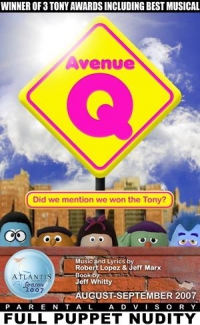
Avenue Q is a musical conceived by Robert Lopez and Jeff Marx, who wrote the music and lyrics, and directed by Jason Moore. The book is by Jeff Whitty. The show was produced by and opened at the Off-Broadway Vineyard Theatre in March 2003. The production transferred to Broadway in July 2003 and won several Tony Awards, including the award for Best Musical. It is still running on Broadway and holds the position of 26th longest running musical in Broadway history. The show has spawned a 2005 Las Vegas production, a 2006 West End production and various international productions. A U.S. national tour began in July 2007.
The show is largely inspired by (and is in the style of) Sesame Street: Most of the characters in the show are puppets (operated by actors onstage), the set depicts several tenements on a rundown street in an "outer borough" of New York City, both the live characters and puppet characters sing, and short animated video clips are played as part of the story. Also, several characters are recognizably parodies of classic Sesame Street characters: for example, the roommates Rod and Nicky are versions of Sesame Street's Bert and Ernie, and Trekkie Monster is based on Cookie Monster. However, the characters are in their twenties and thirties and face adult problems instead of those faced by pre-schoolers, thus making the show more suited for the adults who grew up with Sesame Street. The characters use profanity, and the songs concern adult themes (except the opening number). A recurring theme is the central character's search for a "purpose." Since the musical soundtrack for it was released, the song "The Internet is For Porn" has become particularly popular on websites such as YouTube and can be downloaded for free from the official website. According to the official site, the musical is appropriate for both adults and teenagers.
The show is largely inspired by (and is in the style of) Sesame Street: Most of the characters in the show are puppets (operated by actors onstage), the set depicts several tenements on a rundown street in an "outer borough" of New York City, both the live characters and puppet characters sing, and short animated video clips are played as part of the story. Also, several characters are recognizably parodies of classic Sesame Street characters: for example, the roommates Rod and Nicky are versions of Sesame Street's Bert and Ernie, and Trekkie Monster is based on Cookie Monster. However, the characters are in their twenties and thirties and face adult problems instead of those faced by pre-schoolers, thus making the show more suited for the adults who grew up with Sesame Street. The characters use profanity, and the songs concern adult themes (except the opening number). A recurring theme is the central character's search for a "purpose." Since the musical soundtrack for it was released, the song "The Internet is For Porn" has become particularly popular on websites such as YouTube and can be downloaded for free from the official website. According to the official site, the musical is appropriate for both adults and teenagers.
RAIMUNDO MARTINS
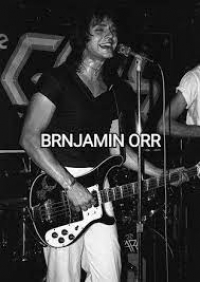
RAIMUNDO MARTINS Composer.
Owl City
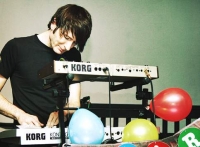
Owl City is an American synthpop musical project by Adam Young. Young started out making music in his parents' basement in Owatonna, Minnesota which he claims is a result of his insomnia.
Young's influences are disco and European electronic music. After two independent albums, Owl City gained mainstream popularity from the 2009 major label debut album Ocean Eyes, which spawned the U.S. Billboard Hot 100 #1 hit single "Fireflies". "Fireflies" topped the US and Canadian charts and became the most-downloaded song on iTunes in the US, and the album Ocean Eyes reached the top ten on the US album charts and topped the US electronic charts. Ocean Eyes also reached Amazon MP3's top 10 most downloaded album list. By December 2009, it was certified Gold in the United States.
Young's influences are disco and European electronic music. After two independent albums, Owl City gained mainstream popularity from the 2009 major label debut album Ocean Eyes, which spawned the U.S. Billboard Hot 100 #1 hit single "Fireflies". "Fireflies" topped the US and Canadian charts and became the most-downloaded song on iTunes in the US, and the album Ocean Eyes reached the top ten on the US album charts and topped the US electronic charts. Ocean Eyes also reached Amazon MP3's top 10 most downloaded album list. By December 2009, it was certified Gold in the United States.
Journey
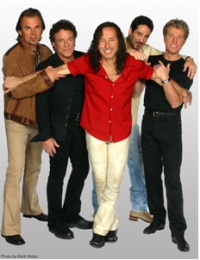
Journey is an American rock band formed in San Francisco, California in 1973.
The band has gone through several phases since its inception by former members of Santana. The band's greatest commercial success came in the late 1970s through the early 1980s with a series of power ballads and songs such as "Don't Stop Believing", "Any Way You Want It", "Faithfully", "Open Arms", "Separate Ways", and "Wheel in the Sky."
Journey has been eligible for induction into the Rock & Roll Hall of Fame since 2000, but Gregg Rolie is currently the only member of Journey who has been inducted—as a member of parent band Santana. In 2009, Steve Perry, the band's best-known lead vocalist, will be eligible for induction as a solo artist.
Current members:
Neal Schon - Lead & rhythm guitars, backing vocals, lead vocals (1973-present)
Ross Valory - Bass, backing vocals, lead vocals (1973-1985, 1995-present)
Jonathan Cain - Piano, keyboards, harmonica, rhythm guitar, backing vocals, lead vocals (1980-present)
Deen Castronovo - Drums, percussion, backing vocals, lead vocals (1998-present)
Arnel Pineda - Lead vocals (2007-present)
The band has gone through several phases since its inception by former members of Santana. The band's greatest commercial success came in the late 1970s through the early 1980s with a series of power ballads and songs such as "Don't Stop Believing", "Any Way You Want It", "Faithfully", "Open Arms", "Separate Ways", and "Wheel in the Sky."
Journey has been eligible for induction into the Rock & Roll Hall of Fame since 2000, but Gregg Rolie is currently the only member of Journey who has been inducted—as a member of parent band Santana. In 2009, Steve Perry, the band's best-known lead vocalist, will be eligible for induction as a solo artist.
Current members:
Neal Schon - Lead & rhythm guitars, backing vocals, lead vocals (1973-present)
Ross Valory - Bass, backing vocals, lead vocals (1973-1985, 1995-present)
Jonathan Cain - Piano, keyboards, harmonica, rhythm guitar, backing vocals, lead vocals (1980-present)
Deen Castronovo - Drums, percussion, backing vocals, lead vocals (1998-present)
Arnel Pineda - Lead vocals (2007-present)
Toto
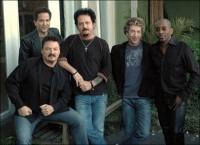
Toto was a Grammy Award winning American rock band founded in 1977 by some of the most popular and experienced session musicians of the era. The band enjoyed great commercial success in the 1980s, beginning with the band's self-titled debut, released in 1978, which immediately brought the band into the mainstream rock spectrum of the time. Continuing with 1982's critically acclaimed and commercially successful Toto IV, Toto became one of the biggest selling music groups of their era. They also composed the theme music for the film Dune. Although their popularity in the United States diminished in the 1990s and 2000s, they continued to tour to sold out arenas, clubs, and theaters internationally. Toto was known for their technical prowess in the studio, as well as a musical style that combines elements of pop, rock, soul, funk, progressive rock, hard rock, R&B, and jazz, making them appeal to a variety of musicians and non-musician listeners. The band has released 17 albums and has sold over 30 million records to date. Their 18th release Falling In Between Live, was released in August 2007. It had been recorded in March 2007 in Paris. As a result of guitarist Steve Lukather's departure from the band, Toto broke up after the last leg of their 2008 tour.
Burt Bacharach
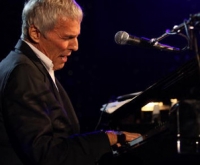
Burt Bacharach (born May 12, 1928) is an American pianist and composer. He is best known for his many pop hits from the early 1960s through the 1980s, with lyrics written by Hal David, many of which were produced for and recorded by Dionne Warwick.
As of 2006, Bacharach had written a total of 70 Top 40 hits in the US, and 52 Top 40 hits in the UK. According to britishhitsongwriters.com he is the eighteenth most successful songwriter in U.K. chart history based on weeks that his compositions have spent on the chart.
As of 2006, Bacharach had written a total of 70 Top 40 hits in the US, and 52 Top 40 hits in the UK. According to britishhitsongwriters.com he is the eighteenth most successful songwriter in U.K. chart history based on weeks that his compositions have spent on the chart.
Mozart

Wolfgang Amadeus Mozart, full name Johann Chrysostom Wolfgang Amadeus Mozart (27 January 1756 â 5 December 1791) was a prolific and influential composer of the Classical era. His over 600 compositions include works widely acknowledged as pinnacles of symphonic, concertante, chamber, piano, operatic, and choral music. Mozart is among the most enduringly popular of classical composers, and many of his works are part of the standard concert repertoire.
Mozart's music, like Haydn's, stands as an archetypal example of the Classical style. His works spanned the period during which that style transformed from one exemplified by the style galant to one that began to incorporate some of the contrapuntal complexities of the late Baroque, complexities against which the galant style had been a reaction. Mozart's own stylistic development closely paralleled the development of the classical style as a whole. In addition, he was a versatile composer and wrote in almost every major genre, including symphony, opera, the solo concerto, chamber music including string quartet and string quintet, and the piano sonata. While none of these genres were new, the piano concerto was almost single-handedly developed and popularized by Mozart. He also wrote a great deal of religious music, including masses; and he composed many dances, divertimenti, serenades, and other forms of light entertainment.
The central traits of the classical style can be identified in Mozart's music. Clarity, balance, and transparency are hallmarks of his work.
Mozart's music, like Haydn's, stands as an archetypal example of the Classical style. His works spanned the period during which that style transformed from one exemplified by the style galant to one that began to incorporate some of the contrapuntal complexities of the late Baroque, complexities against which the galant style had been a reaction. Mozart's own stylistic development closely paralleled the development of the classical style as a whole. In addition, he was a versatile composer and wrote in almost every major genre, including symphony, opera, the solo concerto, chamber music including string quartet and string quintet, and the piano sonata. While none of these genres were new, the piano concerto was almost single-handedly developed and popularized by Mozart. He also wrote a great deal of religious music, including masses; and he composed many dances, divertimenti, serenades, and other forms of light entertainment.
The central traits of the classical style can be identified in Mozart's music. Clarity, balance, and transparency are hallmarks of his work.
Peter Heidrich
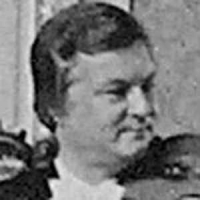
erman classical violinist and composer. Best known for his Variations On Happy Birthday. He also contributed soundtrack music for Europa radioplays in ...
Goran Bregovich

Goran Bregović is a Bosnian recording artist. He is one of the most internationally known modern musicians and composers of the Balkans, and is one of the few former Yugoslav musicians who has performed at major international venues such as Carnegie Hall, Royal Albert Hall and L'Olympia.
Coldplay

Coldplay are a rock band formed in London, England in 1997. The group comprises vocalist/pianist/guitarist Chris Martin, lead guitarist Jonny Buckland, bassist Guy Berryman, and drummer/multi-instrumentalist Will Champion. Coldplay have sold 34.6 million albums, and are also known for their hit singles, such as "Yellow", "The Scientist", "Speed of Sound", "Fix You", "Viva la Vida" and the Grammy Award-winning "Clocks".
Coldplay achieved worldwide fame with the release of their single "Yellow", followed by their debut album, Parachutes (2000), which was nominated for the Mercury Prize. Its follow-up, A Rush of Blood to the Head (2002) won multiple awards such as NME's Album of the Year and was later included on Rolling Stone magazine's 500 Greatest Albums of All Time list, ranking at #473. Their next release, X&Y (2005), received a slightly less enthusiastic yet still generally positive reception. The band's fourth studio album, Viva la Vida or Death and All His Friends (2008), was produced by Brian Eno and released again to largely favourable reviews. All of Coldplay's albums have enjoyed great commercial success.
Coldplay's early material was compared to acts such as Jeff Buckley, U2, and Travis. Coldplay have been an active supporter of various social and political causes, such as Oxfam's Make Trade Fair campaign and Amnesty International. The group have also performed at various charity projects such as Band Aid 20, Live 8, and the Teenage Cancer Trust.
Coldplay achieved worldwide fame with the release of their single "Yellow", followed by their debut album, Parachutes (2000), which was nominated for the Mercury Prize. Its follow-up, A Rush of Blood to the Head (2002) won multiple awards such as NME's Album of the Year and was later included on Rolling Stone magazine's 500 Greatest Albums of All Time list, ranking at #473. Their next release, X&Y (2005), received a slightly less enthusiastic yet still generally positive reception. The band's fourth studio album, Viva la Vida or Death and All His Friends (2008), was produced by Brian Eno and released again to largely favourable reviews. All of Coldplay's albums have enjoyed great commercial success.
Coldplay's early material was compared to acts such as Jeff Buckley, U2, and Travis. Coldplay have been an active supporter of various social and political causes, such as Oxfam's Make Trade Fair campaign and Amnesty International. The group have also performed at various charity projects such as Band Aid 20, Live 8, and the Teenage Cancer Trust.
Air Supply
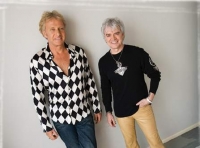
Air Supply is a soft rock duo who had a succession of hits worldwide through the late 1970s and early 1980s. It consists of British guitarist and vocalist Graham Russell (born Graham Cyril Russell, 11 June 1950, Sherwood, Nottingham, England, UK) and Australian lead vocalist Russell Hitchcock (born Russell Charles Hitchcock, 15 June 1949, Melbourne, Victoria, Australia).
Krezip

Krezip is a Dutch band from Tilburg. Active members are singer and pianist Jacqueline Govaert, her sister Anne Govaert on guitar, Annelies Kuijsters playing keyboards, and Joost van Haaren on the bass guitar. In 2004 guitar player Thomas Holthuis was replaced by JanPeter Hoekstra and drummer Thijs Romeijn by Bram van den Berg.
Krezip started as a four-member school band during 1997, in Tilburg, The Netherlands. A year later a new drummer was added. During 1998 Krezip was an act at many festivals throughout the country, such as Festival Mundial, Noorderslag, and Lowlands. Studies and age became a sticking point to accept big offers in the music world. The first official sign of their existence came in 1999, when the band released a demo album on their own label called "Run Around". Big success however didn't materialize until 2000.
The meaning of the name 'Krezip' is rather unclear. Most likely, this name has been chosen as an anagram for 'perzik', the Dutch word for peach, since the band members have continually been eating peaches during their rehearsals.
Jacqueline Govaert has written all of Krezip's songs. She started writing music when she was 12 years old. She states that she can write the best when she doesn't understand anything of the world.
Krezip started as a four-member school band during 1997, in Tilburg, The Netherlands. A year later a new drummer was added. During 1998 Krezip was an act at many festivals throughout the country, such as Festival Mundial, Noorderslag, and Lowlands. Studies and age became a sticking point to accept big offers in the music world. The first official sign of their existence came in 1999, when the band released a demo album on their own label called "Run Around". Big success however didn't materialize until 2000.
The meaning of the name 'Krezip' is rather unclear. Most likely, this name has been chosen as an anagram for 'perzik', the Dutch word for peach, since the band members have continually been eating peaches during their rehearsals.
Jacqueline Govaert has written all of Krezip's songs. She started writing music when she was 12 years old. She states that she can write the best when she doesn't understand anything of the world.
Marco Frisina
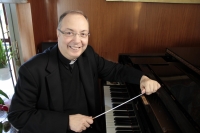
Marco Frisina (born 16 December 1954, in Rome), is an Italian Roman Catholic priest and composer. He is director of the Pastoral Worship Center at the Vatican.
Moulin Rouge!
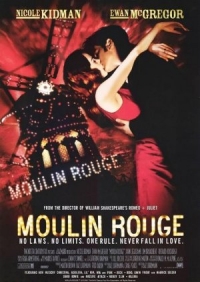
Moulin Rouge! is a 2001 musical film directed by Baz Luhrmann, based largely on the Giuseppe Verdi opera La Traviata. It tells the story of a young British poet/writer, Christian, who falls in love with the star of the Moulin Rouge, cabaret actress and courtesan Satine, played by Ewan McGregor and Nicole Kidman, respectively. It uses the musical setting of the Montmartre Quarter of Paris, France. The film was nominated for eight Oscars, including Best Picture, and won two: for art direction and costume design. It was shot at Fox Studios in Sydney, Australia.
In 2006, Moulin Rouge! ranked twenty-fifth on the American Film Institute's list of best musicals.
In 2006, Moulin Rouge! ranked twenty-fifth on the American Film Institute's list of best musicals.
 Download Sheet Music Net is a site for those who wants to access popular sheet music easily,
letting them download the sheet music for free for trial purposes.
It's completely free to download and try the listed sheet music, but you have to delete the files after 24 hours of trial.
Don't forget, if you like the piece of music you have just learned playing,
treat the artist with respect, and go buy the original sheet music.
Download Sheet Music Net is a site for those who wants to access popular sheet music easily,
letting them download the sheet music for free for trial purposes.
It's completely free to download and try the listed sheet music, but you have to delete the files after 24 hours of trial.
Don't forget, if you like the piece of music you have just learned playing,
treat the artist with respect, and go buy the original sheet music.